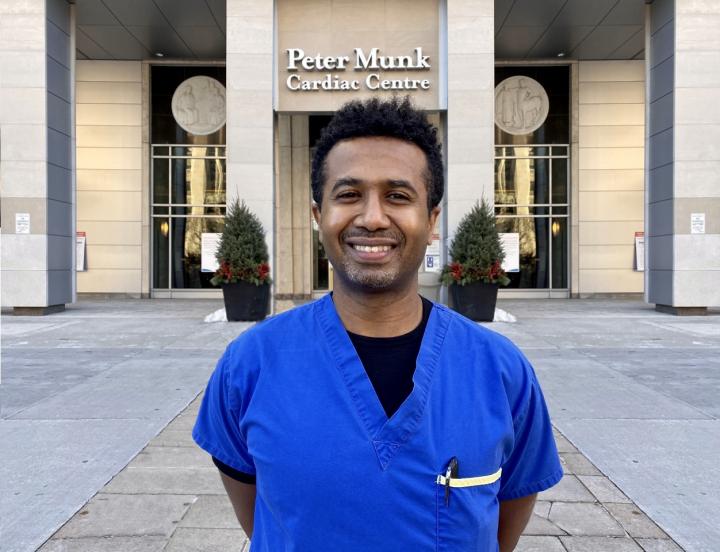
Credit: Photo: UHN
Toronto – New research from UHN’s Peter Munk Cardiac Centre (PMCC) shows statins, commonly prescribed to lower cholesterol and reduce the risk of heart disease and stroke, may also protect the heart from damaging side-effects of early breast cancer treatment.
Published Jan. 6, 2021 in the Journal of the American Heart Association, an observational study found women already taking statins and treated with either anthracyclines or trastuzumab were half as likely to be hospitalized or visit an Emergency Department for heart failure within five years after chemotherapy.
“Our job is to protect the heart and ensure it has the greatest fighting chance to get through chemotherapy,” says Dr. Husam Abdel-Qadir, lead author of the paper and a cardiologist at the PMCC and Women’s College Hospital. He notes prior observational studies have reported measures of heart strength in statin-treated women after chemotherapy, but only focused on a single centre.
“Our study focused on women across Ontario. We went beyond just a number indicating a weaker heart – we focused on heart failure severe enough for women to come to an Emergency Department or be hospitalized.”
Anthracyclines and trastuzumab are effective therapies for many women with breast cancer. However, increased risk of cardiotoxicity has limited their use, and damage can be severe enough to lead to heart failure.
Using several health databases in Ontario, researchers reviewed the occurrence of heart failure in women aged 66 and older who received trastuzumab or anthracyclines for newly diagnosed early breast cancer between 2007 and 2017.
In the 666 pairs of women treated with anthracyclines, those taking statins were 55 per cent less likely to be treated at the hospital for heart failure. In the 390 pairs of women treated with trastuzumab, those taking statins were 54 per cent less likely, which suggested a protective trend but did not meet statistical significance.
Oxidative stress is believed to be one of the mechanisms in which cancer treatment eventually leads to damage of the heart muscle. It is defined as the imbalance of free radicals, compounds which can harm your body if levels are too high, and antioxidants, molecules that fight free radicals.
In addition to lowering cholesterol, statins may also protect the body against the effects of oxidative stress. If statins can stop this imbalance, they may decrease the likelihood the heart sustains damage due to cancer treatment.
“In order to know whether it’s a true cause and effect relationship, we need to do a proper randomized control trial,” says Dr. Abdel-Qadir, who is also part of the Ted Rogers Centre for Heart Research (TRCHR) Cardiotoxicity Prevention Program.
“For the time being, if a woman is supposed to be starting treatment for breast cancer and already has an established indication to be on a statin, there’s now additional motivation to start it or stay on it.”
As for next steps, Dr. Dinesh Thavendiranathan, cardiologist at the PMCC, lead of the TRCHR Cardiotoxicity Prevention Program and senior author on the study is currently recruiting for the SPARE-HF randomized control trial, which will assess whether pre-treatment with statins before anthracycline-chemotherapy can prevent cardiotoxicity in high-risk patients.
“It’s part of the larger principles we try and apply within the TRCHR Cardiotoxicity Program, which is ideally you shouldn’t change the cancer treatment, you let the oncologist pick the best treatment for the patient,” says Dr. Abdel-Qadir.
“We try to reduce the risks that come with it. Our vision is that patients should be able to get the best cancer treatment while reducing concerns for the heart as much as possible.”
###
The study was funded by the Ted Rogers Centre for Heart Research and the Canadian Cardiovascular Society.
About the Peter Munk Cardiac Centre
The Peter Munk Cardiac Centre, established through the generous support of The Peter and Melanie Munk Charitable Foundation, is the premier cardiac centre in Canada. Each year, over 163,000 patients receive innovative and compassionate care from a multidisciplinary team who treat some of the most complex cases of heart and vascular disease. Our clinical and research expertise has improved the lives of patients around the world, while we continue to train more cardiologists, cardiovascular surgeons, and vascular surgeons than any other hospital in Canada. The Peter Munk Cardiac Centre is based at Toronto General Hospital, Toronto Western Hospital and Toronto Rehabilitation Institute – all members of University Health Network. For more information, visit http://www.
About the University Health Network
University Health Network consists of Toronto General, recently voted one of the Top 10 Hospitals in the World according to Newsweek Magazine, and Toronto Western Hospital, the Princess Margaret Cancer Centre, Toronto Rehabilitation Institute, and the Michener Institute of Education at UHN. The scope of research and complexity of cases at University Health Network has made it a national and international source of discovery, education and patient care. It has the largest hospital-based research program in Canada, with major research in cardiology, transplantation, neurosciences, oncology, surgical innovation, infectious diseases, genomic medicine and rehabilitation medicine. University Health Network is a research hospital affiliated with the University of Toronto.
Media Contact
Emma King
[email protected]




